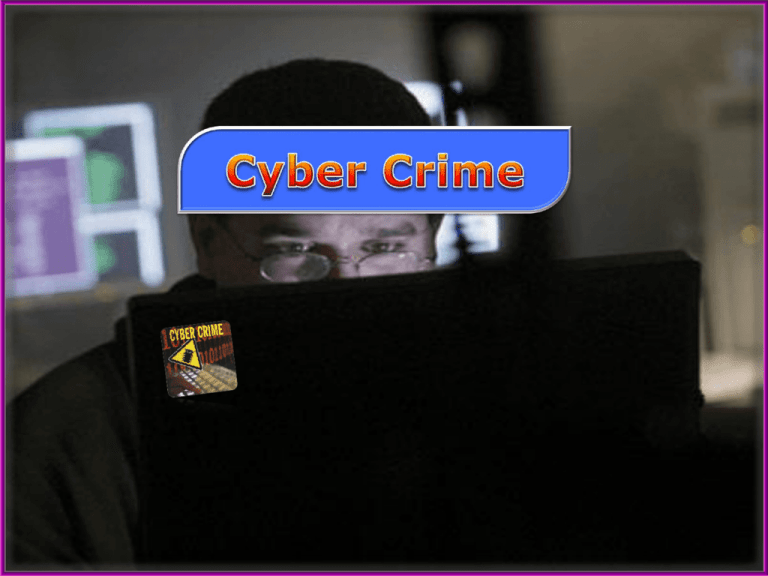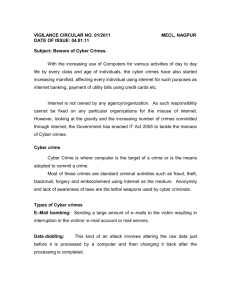File - DelbroTECH.wiki
advertisement

Presented by Daniel Lawrence Delgado CITCS BSIT 1-D Introduction History Cyber Criminals Modes & Manner Categories Types Cyber Security Protecting your privacy How can we protect? Bibliography Concluding remarks Crime committed using a computer and the internet to steal a person's identity or illegal imports or malicious programs Cybercrime is nothing but where the computer used as an object or subject of crime. The first spam email took place in 1978 when it was sent out over the Arpanet (Advanced Research Projects Agency Network),. The first virus was installed on an Apple computer in 1982 when a high school student, Rich Skrenta, developed the Elk cloner. Those who are doing crimes by using the computer as an target or object. i. Children and adolescents between the age group of 6 – 18 years ii. Dissatisfied employees iii. Professional hackers / crackers iv. Organized hackers Unauthorized access to computer systems or networks: This is generally referred as ‘Hacking’. That is accessing the information of others without proper authorization. Theft of information contained in electronic form: This includes theft of information stored in computer hard disks, removable storage media etc. Data diddling: This is altering raw data just before a computer processes it and then changing it back after the processing is completed. Denial of Service attack: The computer is flooded with more requests than it can handle which cause it to crash. Distributed Denial of Service (DDOS) attack is a example. Trojan attacks: It means unauthorized programmer. It gains control over another’s system by representing itself as an authorized programmer. Web jacking: This term is derived from the term hi jacking. In these kinds of offences the hacker gains access and control over the web site of another. Email bombing: It refers to sending large numbers of mail to the victim, which may be an individual or a company by ultimately resulting into crashing. The Cyber crimes are categorized as the following i. Cyber crimes against persons ii. Cyber crimes against Individual Property iii. Cyber crimes against government Under these categorize there are many ways to done Crimes. Here let we see some ways … i. Harassment via e-mails: Harassment through e-mails is not a new concept. It is very similar to harassing through letters. ii. Cyber-stalking : Cyber stalking involves following a person movements across the Internet by posting messages. iii. Email spoofing: A mail which misrepresents its origin. It shows it's origin to be different from which actually it originates. i.Computer Vandalism: Damaging or destroying data rather than stealing or misusing them is called cyber vandalism. ii.Transmitting virus: These are programs that attach themselves to a file and then circulate . They usually affect the data on a computer, either by altering or deleting it. Cyber Terrorism: Terrorist attacks on the Internet is by distributed denial of service attacks, hate websites and hate emails, attacks on sensitive computer networks, etc. Technology savvy terrorists are using 512-bit encryption, which is impossible to decrypt. The recent example may be cited of – Osama Bin Laden, the LTTE, and attack on America’s army deployment system during Iraq war. i. Child Pornography: The use of computer networks to create, distribute, or access materials that sexually use underage children. ii. Cyber Contraband: Transferring illegal items through the internet (such as encryption technology) that is barred in some locations. iii. Cyber laundering: Electronic transfer of illegally-obtained money with the goal of hiding its source and possibly its destination. iv. Cyber Stalking: Threats that creates fear through the use of computer technology such as email, phones, text messages, webcams, websites or videos. v. Cyber Theft: Using a computer to steal. This includes activities related to: breaking and entering, unlawful appropriation, identity theft, fraud, malicious hacking and piracy. Cyber security involves protection of sensitive personal and business information through prevention, detection, and response to different online attacks. Cyber security actually protects your personal information by responding, detecting and preventing the attacks. Privacy policy : Before submitting your name, email address, or other personal information on a web site, look for the site's privacy policy. Evidence that your information is being encrypted : To protect attackers from hijacking your information, any personal information submitted online should be encrypted. Many sites use SSL or secure sockets layer, to encrypt information. Keep software up to date: If the seller releases patches for the software operating your device, install them as soon as possible. Installing them will prevent attackers from being able to take advantage. Use good passwords: Select passwords that will be difficult for thieves to guess. Do not choose options that allow your computer to remember your passwords. Disable remote connectivity: Some PDA’s and phones are equipped with wireless technologies, such as Bluetooth, that can be used to connect to other devices or computers. You should disable these features when they are not in use. Let us conclude that……. Cybercrime is indeed getting the recognition it deserves. However, it is not going to restricted that easily. In fact, it is highly likely that cybercrime and its hackers will continue developing and upgrading to stay ahead of the law. So, to make us a safer we must need cyber security. Thank You very much….. Create Knowledge Apply Apply Knowledge Knowledge Assimilate Assimilate Knowledge Knowledge Seminar Knowledge Sharing And Acquiring Environment Disseminate Knowledge Structure Knowledge “A journey of a thousand sites begins with a single click Full effort is full” victory .”







